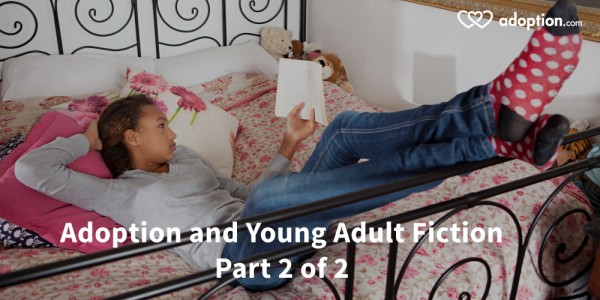In Part 1, I discussed the hidden pitfalls that can confront adoptive families in children’s picture books. In this second part, I want to discuss young adult fiction. This is trickier territory. Young adult novels just by definition deal with more difficult themes. These books tackle the hard things that older children are thinking about and adoption is one of those themes. It is a time in a growing child’s life when they are developing the mental skills to start to understand and decide what they think about a wide variety of topics. It also happens to be a time when adoptees are beginning to revisit the whole idea of adoption and how it pertains to them. It can be a tricky parenting season and it is accompanied by tricky books.
I actually think that reading books with potentially difficult subject matter is a great thing to do with children in junior high and above. They can present ideas and open discussions that might not be possible in everyday conversation with your child. The book provides neutral territory which can help to mediate the emotions that could be involved. This is all an explanation as to why, when it was time to pick the new chapter book I was going to read to my 6th grade sons, I went ahead and chose Found by Margaret Peterson Haddix, which is the first book in The Missing series. Since I devote more time and energy to the reading of chapter books, I do spend some time investigating a book before I decide to read it. It is not a willy-nilly decision (usually) and I more often than not have some idea of what the book is about.
(Warning, if you have not read the book, Found, this is your spoiler alert.)
I knew that my children had enjoyed other books by Ms. Haddix. I knew that she wrote books that are part of series, which is a plus because we are always looking for new reading material. And I also knew that part of the plot of this particular series involved adoption. I knew in advance that it could be tricky territory and I and my adopted son were fine with that. In fact, if being able to talk about the adoption of a fictional character enabled him to voice some ideas and feelings he might not have been able to otherwise, then so much the better.
The book has an exciting opening. An airplane mysteriously appears and the only passengers on board are dozens of babies. Fast forward 12 years later, after each of the babies have been adopted by different families. We meet two of the children who were on that plane and follow along as they try to discover who they are and what their story is. So far, so good. I was impressed with the author’s head-on tackling of the adoption story line. She had the right language; she captured (I think) the emotional lives of the two children who were adopted; and she even nailed the overly positive attitude that adoptive parents can sometimes assume when discussing adoption with their child. There was one twist I wasn’t prepared for, though.
We all are aware that children, even those who are not adopted, can often have fantasies that they are someone “special” if only someone could discover that fact. It’s just that for adopted children, because they have a past life which started with other people, that fantasy has the slimmest chance of actually being true. What if the birth mom whose name we don’t know is actually someone famous? Well, Found provides the ultimate twist on this common fantasy. At the end of the book (which because it’s a series really feels as though it is the end of the introduction), we discover that people in the future who have discovered time travel have been travelling to the past the kidnap ‘famous’ children in order to put them up for adoption (with the corresponding high fees) in that future time. The children on the plane were of this sort and they became the ‘lost children’ of history. You know the ones… the Lindbergh baby, the princes in the Tower, and so on.
Wow.
Just sit and ponder all the potential adoption-related issues that storyline can trigger. And because the revealing of this plot twist is the climax of the story, you don’t read about it on the fly leaf or in the catalogue. Who wants to spoil the best part of the story?
As it turns out, my son was fine with it. Both boys enjoyed the book, but had some issues with it completely unrelated to the adoption theme. (Pacing, or lack of pacing, was their biggest complaint.) Had I known about that plot twist in advance, I probably still would have read it to them because I know what upsets my son in regards to his own adoption and these themes are not troublesome. But I couldn’t help but think that they could be very troublesome for another child and wouldn’t an early warning have been nice.
So once again, I am turning to all of you to encourage you to share your knowledge. While I think hard subjects are OK for older ages, it still would be nice to know what one is getting into. Spoil away. (If you don’t want things spoiled, don’t read the comments.) What books have you read that have a plot elements related to adoption that you wish you had known about ahead of time?

